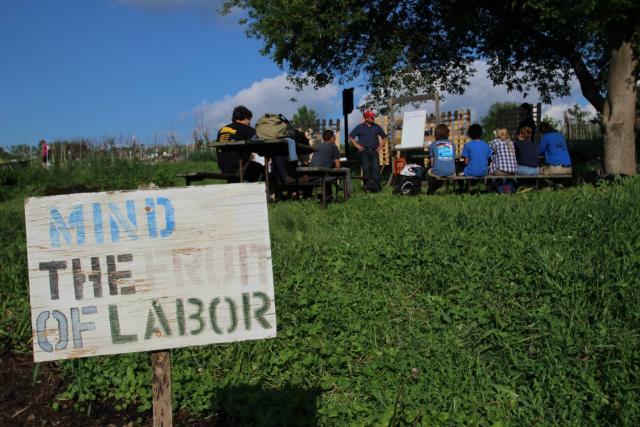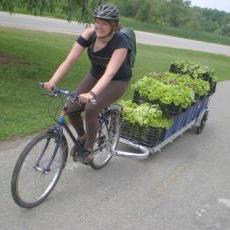






 F.H. King's plot near Eagle Heights uses compost collected on bicycle to grow food for free distribution in Downtown Madison (Courtesy Photo)
F.H. King's plot near Eagle Heights uses compost collected on bicycle to grow food for free distribution in Downtown Madison (Courtesy Photo)
You may want to hold on to your food scraps. A University of Wisconsin-Madison student organization will take them off your hands—and turn them into free food for the downtown community.
The group, F.H. King Students for Sustainable Agriculture, has operated its Full-Cycle Freight community composting program since 2010. Until now, its volunteers have pedaled bikes hitched to trailers to individual residences and businesses that have signed up.
In September, the group launched its first permanent drop-off bins.
The move is designed to both simplify pick-up routes and increase participation, said Frank Laufenberg, the group’s urban agriculture director.
The material is taken to a two-acre farm near the Eagle Heights Community Garden. Here it is composted and used as fertilizer. Ryan Grist, program director, said the compost has helped grow things like various greens, green beans, tomatoes, peas, peppers, squash, sweet corn, potatoes, apples, pears, and berries.
Once it’s ripe, the produce is donated to the Madison community.
The weekly distribution program is called Harvest Handouts and generally draws between 150 to 200 people, according to Grist. A produce stand is set up every Friday from June to October at 333 East Campus Mall. Students, staff, and members of the community are invited to help themselves.
Grist notes that, because the university funds the student organization, the group isn’t allowed to sell the The F.H. King program transports compost and food by bicycle (Courtesy photo) produce.
The F.H. King program transports compost and food by bicycle (Courtesy photo) produce.
Compost drop-off sites include Phoenix Coop, St. Paul’s Catholic Center, and homes on East Gorham Street and East Johnson Street. The group hopes to add more locations in the future.
Metro Place Condominiums near Capitol Square currently participates in the program. While its bins aren’t open to the public, residents of the building contribute to two 13-gallon bins located in the building’s trash room.
“The residents love the program,” said Leann Abrams, assistant manager of Metro Place Condominiums. Abrams noted not all of the building’s 174 units participate.
“I think it’s a wonderful program that the university does for the community and it is nice knowing its students are working hard on learning more about sustainable gardening,” said Abrams.
In addition to food scraps, F.H. King uses leaves, legumes, oats, mulch and lake weeds on its soil.
The group runs a smaller operation atop the Pyle Center with four grow beds and grow bags. Produce grown here also contributes to the Harvest Handouts program.
F.H. King has existed on campus since 1979 and also offers workshops, yoga classes, and volunteer opportunities.
|
|
|
Welcome to the Madison Commons, a website designed to provide news and information about all of Madison's neighborhoods and a crossroads for the discussion of community issues. The name comes from the idea of a village commons, a place for news, talk, debate, and some entertainment, too, that's open to everyone.
All rights reserved. Read more about the Madison Commons and its partners.

